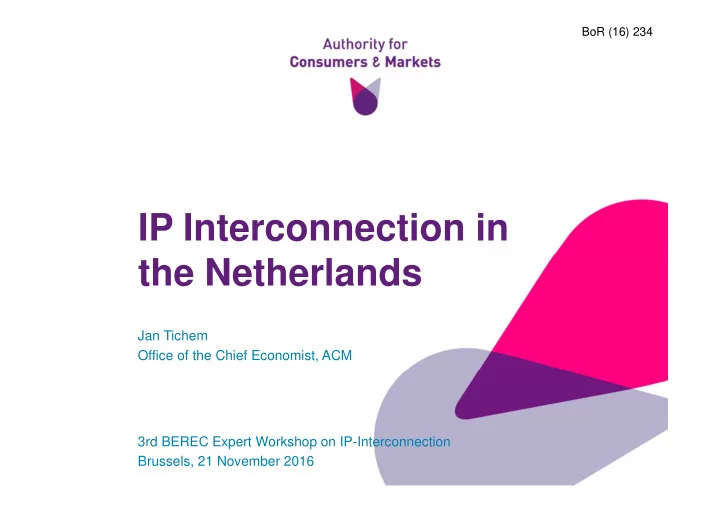

BoR (16) 234 IP Interconnection in the Netherlands Jan Tichem Office of the Chief Economist, ACM 3rd BEREC Expert Workshop on IP-Interconnection Brussels, 21 November 2016
Research done by ACM • Request from Ministry of Econ. Affairs: – Any “restrictive IP Interconnection behaviour” in NL? – If so, are existing instruments of regulator sufficient? • Method: – Formulate possible theories of harm – Interviews - CAPs, ISPs, IXPs, transit providers and experts – Assess likelihood of competition problems • Report published last year (in English): https://www.acm.nl/nl/publicaties/publicatie/14769/Onderzoek- IP-interconnectie-in-Nederland/
Theory of harm 1 • Exploitation of a competitive bottleneck • Idea: to reach ISP’s customers, CAPs’ traffic must go through ISP’s network, so ISP may be able to levy a “termination fee” • Relevant questions for assessment: – Are customers single- or multi-homing? – Do customers switch networks if quality of (some) content is low? – Is transit a substitute for peering? – Do CAPs have countervailing bargaining power?
Theory of harm 2 • ISPs may use the competitive bottleneck to foreclose the market for content (vertical integration to content) • Idea: ISP favors own content by hindering IP Interconnection with other CAPs • Relevant questions for assessment: – Does the ISP have market power in the market for Internet access services? – Degree of competition in the content market and the ISP’s position on the market for content – Is there really an incentive to favor own content?
Possible efficiencies/justifications • Legitimate aim to protect transit business • Allowing for settlement fees can generate more mutually beneficial peering deals • Settlement fees can simply reflect bargaining strength • Refusal to peer may be caused by excess capacity on other peering links
Evidence on NL situation from interviews • No degradation of QoS due to insufficient interconnection capacity in NL • Paid peering rare • Sufficient transit capacity • Sometimes CAPs revert to transit because they don’t want to set a precedent • Combination of small country and large IXP • AMS-IX not-for-profit
General assessment of the theories of harm • Internet retail market is quite competitive • 14% churn on average per year, quality seems to matter for consumers • Mobile not yet a substitute for fixed, but this may change in the future • Transit usually is a substitute for peering • Incentives to foreclose competing CAPs can only be assessed on a case-by-case basis
Recent activities of ACM • Two disputes over settlement fees for peering brought to our attention • No intervention, parties resolved dispute themselves • In both cases parties eventually peered, in one case without settlement fee
Conclusions • IP Interconnection is about two parties that complement each other finding the most efficient way to interconnect, and divide the gains from their transaction • Limited risk of competition problems in IP Interconnection in NL • Competition law should suffice, case-by-case approach
Recommend
More recommend